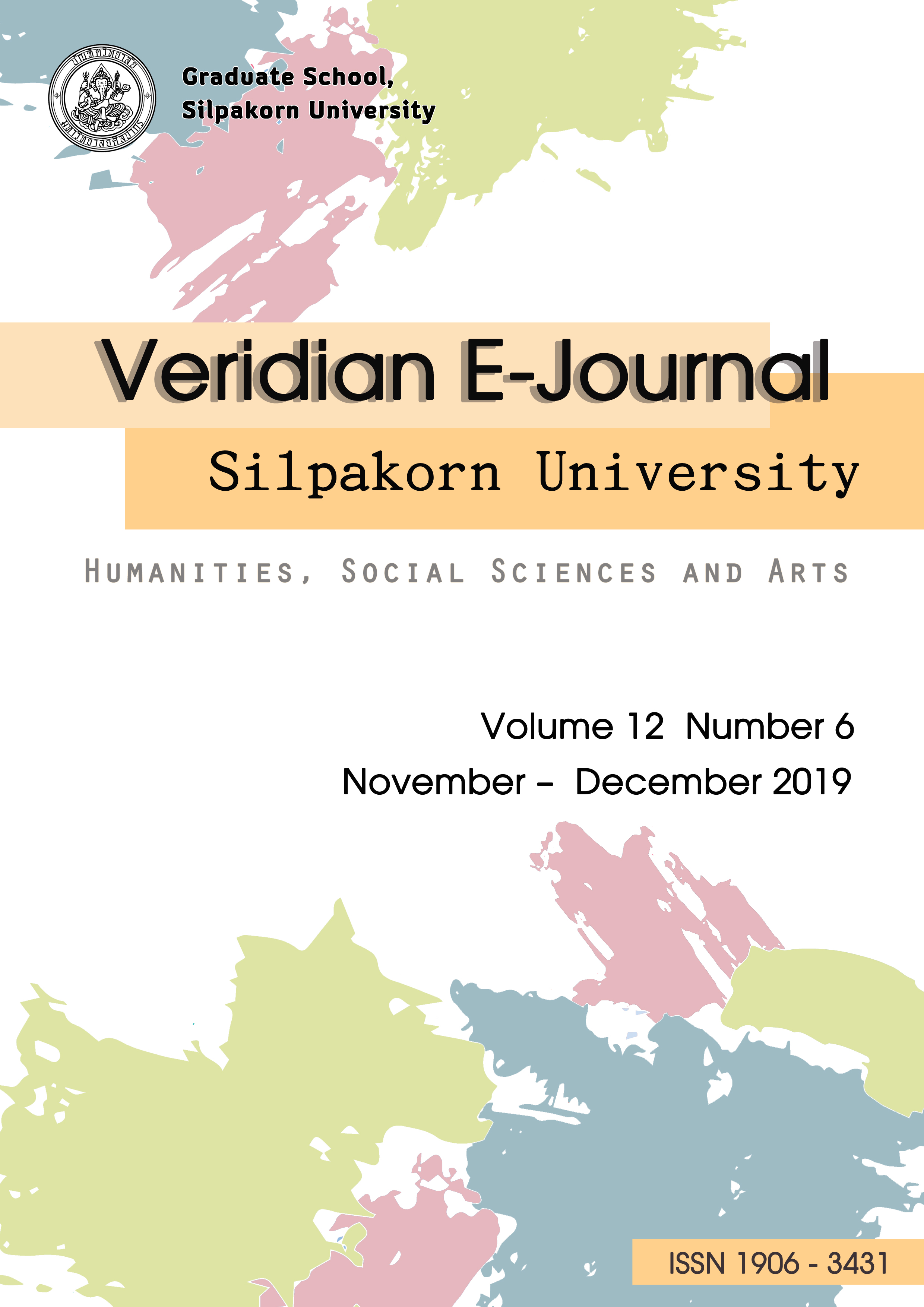ผลกระทบของการฝึกอบรมเพื่อพัฒนาความเป็นผู้ประกอบการต่อการรู้คิดและความตั้งใจเป็นผู้ประกอบการเทคโนโลยีและนวัตกรรมของนักศึกษาด้านการบริหารธุรกิจ ชั้นปีที่ 4 (The Impact of Entrepreneurial Training on Technology and Innovation-Based Entrepreneurial Cognition and Intention of the Fourth Year Business Students)
Main Article Content
บทคัดย่อ
การวิจัยครั้งนี้มีวัตถุประสงค์เพื่อศึกษาถึงผลกระทบของการฝึกอบรมเพื่อพัฒนาความเป็นผู้ประกอบการต่อการรู้คิดและความตั้งใจเป็นผู้ประกอบการเทคโนโลยีและนวัตกรรมของนักศึกษาด้านการบริหารธุรกิจ ชั้นปีที่ 4 และรูปแบบความสัมพันธ์เชิงสาเหตุของการฝึกอบรมเพื่อพัฒนาความเป็นผู้ประกอบการ ที่ส่งผลต่อการรู้คิดและความตั้งใจเป็นผู้ประกอบการเทคโนโลยีและนวัตกรรมของนักศึกษาด้านการบริหารธุรกิจ ชั้นปีที่ 4 เครื่องมือที่ใช้ในงานวิจัย คือ แบบสอบถามซึ่งพัฒนามาจากการทบทวนวรรณกรรม และการตรวจสอบความเชื่อมั่น โดยการทดสอบค่าสัมประสิทธิ์อัลฟ่าครอนบาค แบบสอบถามได้กระจายแก่กลุ่มตัวอย่าง ซึ่งเป็นนักศึกษาที่กำลังศึกษาอยู่ในหลักสูตรทางด้านบริหารธุรกิจ ชั้นปีที่ 4 จำนวน 220 คน จากนั้นทำการวิเคราะห์โมเดลการวัด และวิเคราะห์โมเดลสมการโครงสร้างก่อนการทำการตรวจสอบสมมติฐานด้วยวิธีการวิเคราะห์ข้อมูลสถิติแบบเส้นทางกำลังสองน้อยที่สุดบางส่วน (Partial Least Square: PLS-SEM) ด้วยโปรแกรมสำเร็จรูป SmartPLS
ผลการวิจัยพบว่า การฝึกอบรมเพื่อพัฒนาความเป็นผู้ประกอบการเป็นปัจจัยที่ส่งผลเชิงบวกต่อการรับรู้ความสามารถตนเอง การรับรู้ความเป็นไปได้ทางธุรกิจและการมุ่งเน้นความเป็นผู้ประกอบการ นอกจากนี้ การมุ่งเน้นความเป็นผู้ประกอบการยังเป็นปัจจัยสำคัญที่สุดที่ส่งผลเชิงบวกต่อความตั้งใจเป็นผู้ประกอบการเทคโนโลยีและนวัตกรรมของนักศึกษาด้านการบริหารธุรกิจ ชั้นปีที่ 4 รองลงมาคือ การรับรู้ความเป็นไปได้ทางธุรกิจและการรับรู้ความสามารถของตนเอง ตามลำดับ โดยการฝึกอบรมเพื่อพัฒนาความเป็นผู้ประกอบการมีอิทธิพลทางตรงต่อการรับรู้ความสามารถของตนเอง และยังมีอิทธิพลทางตรงและทางอ้อมต่อการมุ่งเน้นความเป็นผู้ประกอบการและการรับรู้ความเป็นไปได้ทางธุรกิจและอิทธิพลทางอ้อมต่อความตั้งใจเป็นผู้ประกอบการเทคโนโลยีและนวัตกรรม ในขณะที่การรับรู้ความสามารถของตนเองมีอิทธิพลทางตรงต่อการรับรู้ความเป็นไปได้ทางธุรกิจและยังมีอิทธิพลทางตรงและทางอ้อมต่อการมุ่งเน้นความเป็นผู้ประกอบการและความตั้งใจเป็นผู้ประกอบการเทคโนโลยีและนวัตกรรม โดยการรับรู้ความเป็นไปได้ทางธุรกิจมีอิทธิทางตรงต่อการมุ่งเน้นความเป็นผู้ประกอบการ และยังมีอิทธิพลทางตรงและทางอ้อมต่อความตั้งใจเป็นผู้ประกอบการเทคโนโลยีและนวัตกรรม นอกจากนี้ ยังพบว่าการมุ่งเน้นความเป็นผู้ประกอบการมีอิทธิพลทางตรงต่อความตั้งใจเป็นผู้ประกอบการเทคโนโลยีและนวัตกรรม โมเดลสมการโครงสร้างสามารถอธิบายผลของความตั้งใจเป็นผู้ประกอบการเทคโนโลยีและนวัตกรรมของนักศึกษาด้านการบริหารธุรกิจ ชั้นปีที่ 4 ได้ร้อยละ 64.80 (R2 = 0.648, R2adj = 0.644 ) จากผลการวิจัยเป็นประโยชน์ต่อสถาบันการศึกษา ศูนย์บ่มเพาะธุรกิจ และผู้มีส่วนเกี่ยวข้องในการเพิ่มระดับความตั้งใจเป็นผู้ประกอบการเทคโนโลยีและนวัตกรรมของนักศึกษาด้านการบริหารธุรกิจ ชั้นปีที่ 4 โดยผ่านการมุ่งเน้นความเป็นผู้ประกอบการที่เกิดจากการรับรู้ความเป็นไปได้ทางธุรกิจ การการฝึกอบรมเพื่อพัฒนาความเป็นผู้ประกอบการ และการรับรู้ความสามารถของตนเอง ตามลำดับ
This research set to study the impact of entrepreneurial training on technology and innovation-based entrepreneurial cognition and intention of the fourth year business students and a causal model of entrepreneurial training affecting technology and innovation-based entrepreneurial cognition and intention of the fourth year business students. The study used a questionnaire developed by reviewing the literature and testing the reliability using coefficient alpha. The questionnaire was distributed to 220 samples of the fourth year business students. Then analysis the measurement model and structural equation modeling before hypotheses testing by Partial Least Square Structural Equation Modeling (Partial Least Square: PLS-SEM) with SmartPLS software.
The results found that the entrepreneurial training had the factor that positively effects on perceived self-efficacy, perceived feasibility and entrepreneurial orientation. Moreover, the entrepreneurial orientation had the most influential factor that positively effects on technology and innovation-based entrepreneurial Intention of the fourth year business students, followed by perceived feasibility and perceived self-efficacy, respectively. Which the entrepreneurial training directly affected perceived self-efficacy as well as directly and indirectly influenced entrepreneurial orientation and perceived feasibility also indirectly influenced technology and innovation-based entrepreneurial Intention. Whereas the perceived self-efficacy directly affected perceived feasibility as well as directly and indirectly influenced entrepreneurial orientation and technology and innovation-based entrepreneurial Intention. Which the perceived feasibility directly affected entrepreneurial orientation as well as directly and indirectly influenced technology and innovation-based entrepreneurial Intention. In addition found that the entrepreneurial orientation directly affected technology and innovation-based entrepreneurial Intention. The structural equation model can explain technology and innovation-based entrepreneurial Intention of the fourth year business students at 64.80 percent (R2=0.648, R2adj=0.644). The results of this research are beneficial to educational institution, business incubator and stakeholder to increase technology and innovation-based entrepreneurial Intention of the fourth year business students through the entrepreneurial orientation by perceived feasibility, entrepreneurial training, and perceived self-efficacy, respectively.

